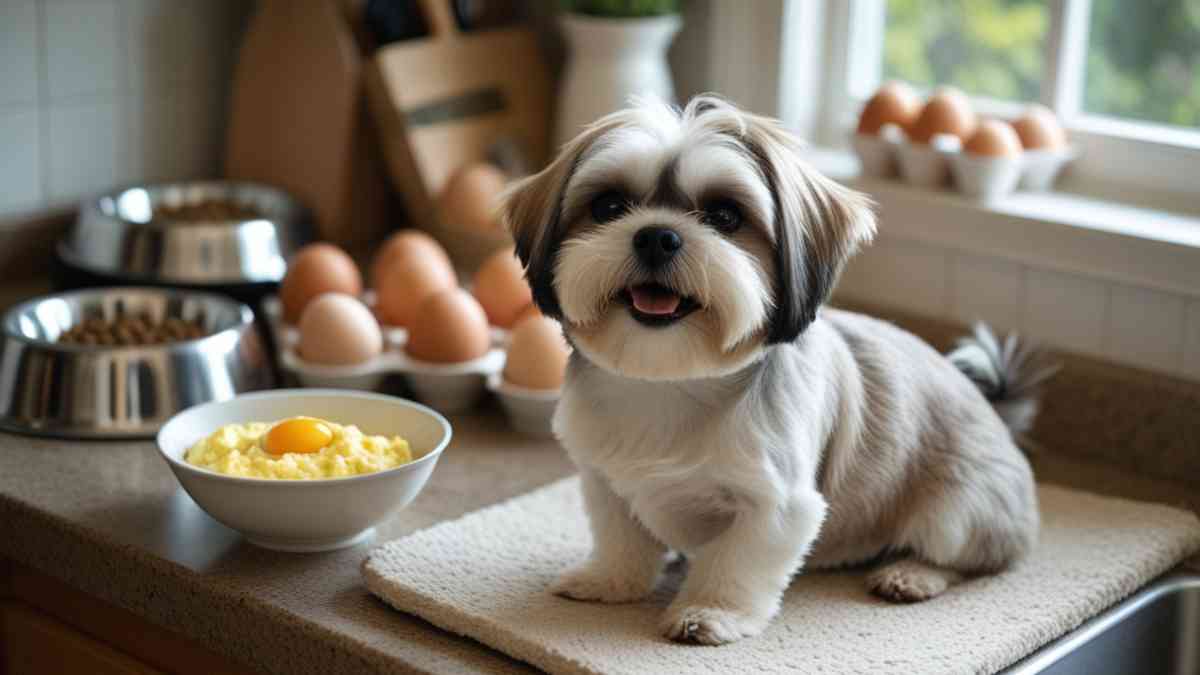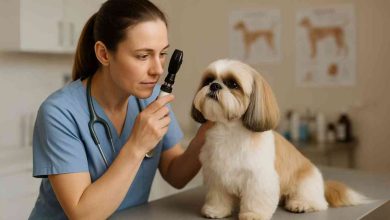Can Shih Tzu Eat Eggs? Benefits, Risks & How to Serve

When it comes to feeding your Shih Tzu, you want only the best. Many dog owners ask, “Can Shih Tzus eat eggs?” The answer is yes—but it’s not that simple. Eggs can be an excellent source of nutrients for your Shih Tzu, but there are important things to know about preparation, portion size, and potential risks. This article explores everything in detail, based on veterinary insights and real-world feeding practices.
Eggs Are Nutritionally Powerful
Eggs are one of the most complete sources of animal protein available. A single egg contains protein, healthy fats, and a rich mix of vitamins like A, D, E, B2 (riboflavin), and B12. For your Shih Tzu, that translates to energy, tissue repair, a healthier coat, and better immune health. They also contain minerals like iron, selenium, and phosphorus, which contribute to red blood cell production and metabolism.
Yes, But They Must Be Cooked
Veterinarians recommend that Shih Tzus eat only cooked eggs. Raw eggs may carry the risk of Salmonella or biotin deficiency due to avidin in raw egg whites. Boiled, scrambled, or poached eggs are safe options, as long as they are cooked plain without butter, salt, or seasoning. Avoid using oils or additives when preparing eggs for your dog.
Moderation Is the Key
Even though eggs are healthy, feeding too many can upset your Shih Tzu’s nutritional balance. A small breed like this doesn’t require large portions. Veterinarians suggest feeding no more than one egg per week, ideally divided over a few meals. For puppies or seniors, the amount may need adjustment based on their weight and activity levels.
Health Benefits of Eggs
The question “can Shih Tzus eat eggs” isn’t just about safety—it’s also about benefits. Protein in eggs supports muscle strength, especially helpful in active or recovering dogs. Omega-3 fatty acids in eggs nourish the skin and improve coat texture. Choline, another egg nutrient, is linked to brain health and better cognition, especially valuable for senior dogs. Plus, vitamin D supports strong bones and teeth.
Risks to Watch For
While eggs are generally safe, some dogs might be allergic. Symptoms of an egg allergy can include vomiting, diarrhea, excessive itching, or chronic ear infections. If your Shih Tzu displays any of these signs after eating eggs, discontinue immediately and consult a veterinarian.
Another concern is obesity. Eggs are calorie-rich, and for a small dog like the Shih Tzu (typically weighing 9 to 16 pounds), even one extra treat can lead to weight gain over time. This is why eggs should only supplement a complete diet and not replace meals.
How to Serve Eggs Properly
Boiled eggs are the easiest and safest method—you can peel and chop them into small pieces and mix with your dog’s kibble or serve alone as a treat. Scrambled eggs are fine too, but skip the butter and spices. Poached eggs work well if done in plain water. Never feed fried or raw eggs.
Avoid Eggshells Unless Approved
You may hear that eggshells are a good calcium source. While true, they pose a choking hazard and risk internal injury if fed whole. If you want to use eggshells, they must be sterilized and finely ground into powder. This should only be done under veterinary guidance.
Are Eggs Safe for Shih Tzu Puppies?
Yes, but even more caution is required. Puppies benefit from protein and fat, but they need a balanced puppy diet. You can start with small portions (like a teaspoon of chopped egg) once or twice a week after 8 weeks of age. Always observe for digestive reactions.
Portion Guidance by Weight
- Under 10 lbs: Half an egg per week
- 10–16 lbs: One egg per week
- Over 16 lbs (rare for Shih Tzus): No more than 1.5 eggs per week
The egg should be cut into manageable sizes to avoid choking. Shih Tzus have small mouths and delicate digestion, so soft and easily chewable textures are important.
Human Foods and Balanced Feeding
Many owners want to treat their dogs like family, sharing food. While eggs can be shared safely, avoid feeding leftovers like bacon, seasoned eggs, or breakfast platters. These include too much sodium and fat. Instead, focus on home-cooked, dog-safe recipes with eggs as a supplement.
Physical Traits and Dietary Needs
Shih Tzus are known for their beautiful, flowing double coats and short snouts. These physical features also mean they need nutrients that support skin, fur, and breathing. Eggs help maintain a shiny, dandruff-free coat, while also supporting muscle tone. Adult Shih Tzus are typically 9 to 10.5 inches in height and weigh 9 to 16 pounds, making portion control essential.
Social Presence and Feeding Trends
On social media, especially Instagram and TikTok, many dog parents share homemade meals for their pets. Among them, eggs are a trending ingredient in DIY dog breakfast bowls. While these videos may inspire, always follow vet-recommended practices, not viral fads. Your Shih Tzu’s health comes first.
A Few Expert Tips
- Use organic or pasture-raised eggs when possible.
- Introduce slowly and one change at a time in diet.
- Monitor stools and skin after introducing eggs.
- Eggs should never make up more than 10% of daily calories.
- Consult your vet before making eggs a regular treat.
Quick Nutrition Fact
One large boiled egg contains:
- 6g protein
- 5g fat
- 70-80 calories
- 1.6 mcg Vitamin B12
- 147mg choline
Conclusion
So, can Shih Tzu eat eggs? Absolutely—as long as they are fully cooked, portioned properly, and introduced carefully. Eggs offer multiple health benefits, from a shiny coat to brain health, but overdoing it or serving them raw can be harmful. As with all foods outside their main diet, moderation and monitoring are key.
Eggs can be an affordable and healthy addition to your Shih Tzu’s nutrition plan—just remember to cook them clean and serve them wisely.
Try giving your Shih Tzu a soft boiled egg this week and see them thrive!
Treat your Shih Tzu to a healthy cooked egg—safely and smartly!




